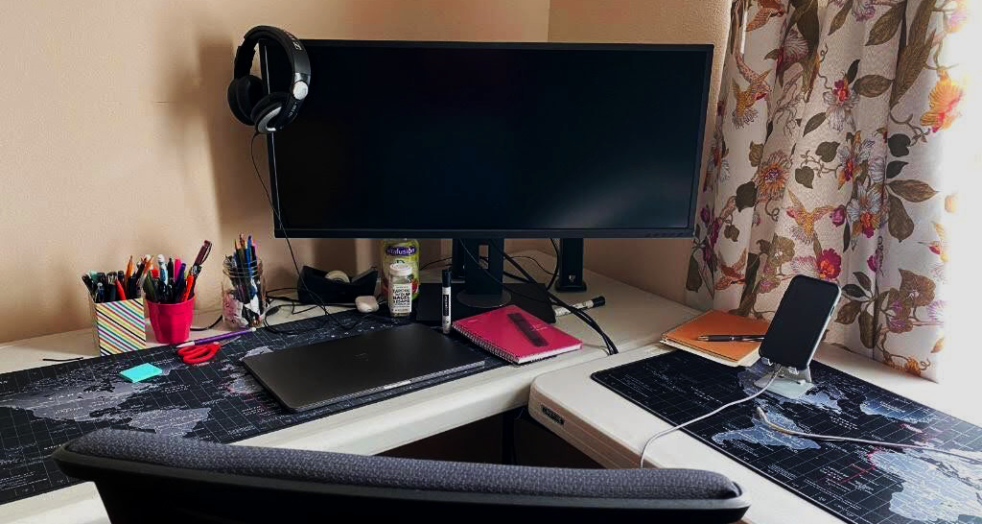Since the COVID-19 vaccine became available to all Americans ages 12 and up, many have felt as though life is returning to normal.
However, a community of students have spent an entire year in isolation — attending Tech exclusively online. Their lives have been completely halted, and they are not hopeful things will ever be the same again.
For students who began their freshman year amid the pandemic, some found themselves being disappointed by an isolating experience that fell short of their expectations for college.
For Saksham Malik, second-year CHBE, online schooling changed his perspective on learning and made him lose interest in subjects he once loved.
“I certainly expected to be learning a lot more and enjoying learning,” Malik said. “I’m always someone who loves to sit in a classroom and get fired up with those STEM classes especially. I’ve noticed that now, I’ve just been doing them for the sake of it, and I’m not really enjoying learning.”
Sneha Roy, second-year CS, agreed. Roy expressed disappointment in missing out on the community you would traditionally build in college.
“I was excited for late nights in the dining hall, and I was looking at different college vlogs. I was eager to see how it would be to stay late at the library or go through the struggle of finals season with friends. I imagined that and unfortunately, that didn’t happen,” Roy said.
Students who have attended Tech virtually overwhelmingly agree that being away from campus was detrimental to their mental health.
These students described feeling isolated, anxious and depressed, and they expressed concern over how this experience will impact their ability to socialize when they eventually return to campus.
“Being away from campus has negatively impacted my mental health. I’ve had less personal freedom, I feel a bit ‘behind’ my peers socially,” said Solomon A. Takang, fourth-year BME.
Roy compared her experience to high school, citing the shift from consistent socialization to virtual social isolation as the greatest harm to her mental health.
“It was just a more stressful situation. Online, I didn’t know anyone from college, and I still barely know people. It was a struggle,” Roy said.
According to the Atlanta-Journal Constitution, counselors in the University System of Georgia (USG) have been struggling to connect students who are not on campus with mental health resources.
Since the on-set of the pandemic, many USG schools have expanded their mental health resources to provide greater support to students.
While Tech has put greater emphasis on mental health resources such as the Georgia Tech Counseling Center, students say these resources are not as accessible as they are made out to be.
Malik said attempting to get help from the Counseling Center was a confusing and time-consuming ordeal.
When he contacted the Counseling Center, it took several days to hear back, and he felt their response was disappointing. The Counseling Center denied him care because he is an international student. Instead, he was directed to different virtual resources such as helplines and counseling apps, which he described as being ineffective.
“It’s too inaccessible if I have to make such an effort. If someone was in a worse position, and if this is so much effort for them, then something worse might happen,” Malik said.
Roy agreed, saying there are far too many obstacles to access support services on campus.
“I’ve been thinking about it, but I haven’t because I don’t know where to [go]. It seems like a lot of work, and it’s not really convenient,” Roy said.
“There’s so much pressure with school that I have to choose between: do I deal with my mental health, or do I study for an exam?”
According to the Counseling Center, international students currently living abroad have two options for care, either calling Christie Campus Health (a 24/7 hotline) or seeking care themselves where they are living.
Students living outside the state of Georgia but in the United States can receive referrals from the Counseling Center but are not eligible for on-going care through the Center.
Finally, students living anywhere in the state of Georgia can receive on-going care through the Center.
While virtual students have been struggling with feelings of isolation, they have tried to make the best of their circumstances by connecting with others virtually.
“I have felt somewhat connected to the campus through keeping in contact with my friends virtually, but that has been my only social outlet through the school year. It’s been a mix of both my personal community and GT’s virtual social events,” Takang said.
On the other hand, students whose first year was virtual had more difficulty forming a community.
“I talked to some of [the students in class], and when you’re talking to students who are attending remotely, it’s fine. But, when you’re talking to someone who’s on campus, and you’re trying to talk to them virtually via BlueJeans, it doesn’t work very well.” Malik said.
Though students who have been attending Tech exclusively online are anxious to return to campus, they say these feelings have become more complicated over time.
“I’m just ready to leave because I’ve been waiting for a whole year for this one event, and I only have so much excitement left. This excitement has just kind of died. I just want to get on with my life, at this point,” Roy said.
Tech is expected to return to fully residential operations in Fall 2021, including fully residential course modes.
